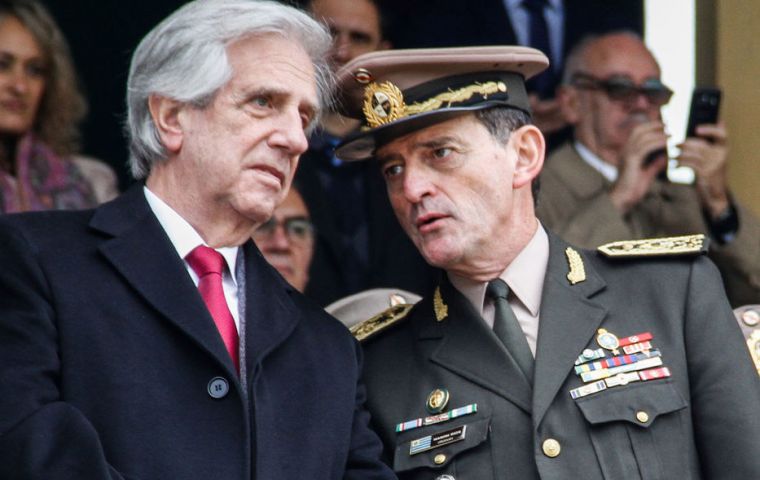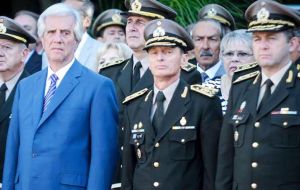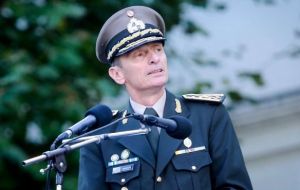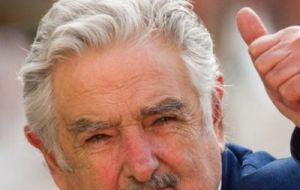MercoPress. South Atlantic News Agency
Uruguayan president caught on the wrong foot forced to sack six generals and minister of Defense
 President Vazquez will have three different Army chiefs in less than a month
President Vazquez will have three different Army chiefs in less than a month  The explosive minutes of a military Tribunal of Honor with a crime admission, allegedly were not checked by the Executive Office but approved by Vazquez
The explosive minutes of a military Tribunal of Honor with a crime admission, allegedly were not checked by the Executive Office but approved by Vazquez  General Jose Gonzalez, ex Army chief sacked
General Jose Gonzalez, ex Army chief sacked  Ex president Mujica who has a majority in the Legislative and with the Defense ministry under his wing
Ex president Mujica who has a majority in the Legislative and with the Defense ministry under his wing Uruguay’s president has been involved in an embarrassing incident which forced him on Monday to remove the commander in chief of the army, the Defense Chief of Staff and four other generals for allegedly covering up that a retired member of the military committed a crime during the 1973-1985 dictatorship.
However it has now emerged and has been admitted by the presidential office that the alleged cover up reports were in effect received and given an automatic approval signature by President Tabare Vazquez.
In other words President Vazquez nor any members of his Executive Office read the report: the minutes of military tribunals of honor, in which a retired colonel admits to having dumped the body of a tortured prisoner into a river. The military as is normal procedure presented the tribunal of honor minutes to the Commander in Chief of the Armed Forces, president Vazquez, for his approval, rejection or further investigation.
It must be said that none of the generals involved in the Tribunals of Honor indicated such crime or crimes to their immediate superiors, the Minister of Defense and President Vazquez. However both the ministry and the Executive Office had the obligation to read or look into the minutes of the military tribunal of honor procedures since in this case it involved former military officers, notorious for their participation in torture and disappearance of prisoners, both guerrillas or simple political militants during the 1973/85 military dictatorship, and have been sentenced and jailed for life.
The extent of the incident and some of the contents of the tribunals of honor minutes were made public in the Montevideo media over the weekend, triggering the embarrassing situation.
President Tabare Vazquez thus dismissed Gen. Jose Gonzalez and five other generals. Gonzalez had been on the job for just two weeks and had replaced Gen. Guido Manini Rios. Vazquez removed Manini Rios last month after he questioned how local courts have handled cases involving members of the military accused of dictatorship-era human rights abuses.
Before his short live period as head the Army, General Gonzalez and the other generals acted as members of two tribunals of honor in which one of the jailed officers admits the crime which remained unsolved, and the body disappeared since 1973 when he was kidnapped and tortured. He was a microbiology professor at the Agriculture school and was not an active guerrilla member but belonged to a support group.
The Uruguayan political system immediately supported President Vazquez decisions to purge the military, but at some point he will have to respond why he “blindly” stamped an approval signature to the military courts reports, and who he will choose as his next Army chief, from the nine out of sixteen generals, left.
Likewise Vazquez who also sacked the Defense minister and his Deputy will have to find a way to balance his cabinet, since Defense under the ruling coalition's agreements is the turf of the former guerrilla movement Tupamaros, which as a political group is led by ex president Jose Mujica, and his majority in the Legislative.
This won't be an easy or gentle task since the Socialist party to which Vazquez belonged and the MPP of Mujica, despite sharing the coalition, don't get along. Such is the case that in this election year the ruling Broad Front coalition has two main candidates, Socialist Daniel Martinez, mayor of Montevideo, and Carolina Cosse, ex Industry minister promoted by Mujica. Private talks to reach an internal agreement and avoid a bloody confrontation and peaceful man/woman or woman/man ticket collapsed because Martinez rejected point blank such an option. In the previous general election in Uruguay, 2014, Mujica and MPP quashed Martinez presidential aspirations and he had to run for mayor of Montevideo, which he managed successfully defeating none else than Lucia Topolansky, currently vice president and the wife of Jose Mujica.
More than 40 members of the military have been investigated after being accused of human rights crimes. Some of the aging ones have died in prison. Hundreds were arrested and tortured in Uruguay during the dictatorship and an estimated 400 people were forcibly disappeared, mostly in Argentina since the Uruguayan military coup took place three years before the 1976 coup in Argentina. Of those 400, the relatives of some 300 receive compensations from the Argentine government.




Top Comments
Disclaimer & comment rules-

-

Read all commentsWow, what a mess. Perhaps President Vazquez should employ an intern to read his reports for him, since apparently none of the people whose job it is can be bothered to do it. I wonder who leaked the report to the media?
Apr 02nd, 2019 - 10:51 am 0It was there. Journalist Leonardo Haberkorn just revealed it from a public paper on Defense Ministry on El Observador (https://www.elobservador.com.uy/nota/gavazzo-admitio-que-arrojo-el-cuerpo-de-roberto-gomensoro-al-rio-negro-2019329181326)
Apr 02nd, 2019 - 12:22 pm 0Commenting for this story is now closed.
If you have a Facebook account, become a fan and comment on our Facebook Page!